
Stronger collaboration required to curb modern day slavery
Non governmental organisation (NGO) ActionAid Ghana (AAG), has called for stronger collaboration between state and non-state actors to curb modern day slavery in the country.
Advertisement
It said it was unacceptable that in spite of the global push for decent work and end to forced labour, vulnerable group, particularly women and girls continue to fall victims to modern day slavery.
In the view of the Country Director of AAG, John Nkaw, apart from being dehumanising, modern slavery was inimical to sustainable national development and infringed on the rights of the victims.
He made the call at a validation workshop organised by AAG to validate the report on the Combatting Modern Slavery (CMS) project in Accra on last Thursday.
The event brought together key stakeholders and representatives from the Office of the Attorney General and Ministry of Justice, Commission on Human Rights and Administrative Justice (CHRAJ), Economic and Organised Crime Unit (EOCO), Anti-Human Trafficking Unit (AHTU) of the Ghana Police Service, ministries of Foreign Affairs and Regional Integration as well as Employment and Labour Relations.
Context
The WalkFree Global Slavery Index report (2023) has indicated that Ghana's prevalence of modern slavery is 2.9 per 1000 people.
This translates to 91,000 people.
Factors such as poverty and gender discrimination intersect to make women particularly vulnerable to modern slavery.
In contributing towards addressing the phenomenon of modern day slavery, the Norwegian Agency for Development Cooperation (NORAD) funded ActionAid Ghana (AAG) to implement a three-year multi-country project dubbed “Combating Modern Slavery (CMS)” in Ethiopia and Ghana from 2021 to 2023.
For effective implementation of the project, AAG partnered the General Agriculture Workers Union (GAWU).
The $1.3-million CMS project was implemented in Ethiopia and Ghana, with the aim to decreasing the scale and prevalence of modern slavery in the agricultural, industrial, and service sectors.
The project was also aimed at raising awareness of modern slavery with a focus on child labour, human trafficking and forced labour.
In Ghana, the project covered 100 communities in 12 districts across four regions.
Meaningful impact
Mr Nkwa, said the CMS project had brought relief to women and children over the past three years through many interventions such as livelihood skill training and start-up support, the training of community-based anti-human trafficking combats and the rescuing and reuniting of survivors.
He added that 398 female household heads have been supported with livelihood skills which made them independent and resourceful, thereby reducing their vulnerability and that of their children to modern slavery.
Again, he said the beneficiaries were given start-up equipment worth GH¢1,994,306 for the four project region - Bono, the Northern Region, the Upper West, and the Oti region.
He said the beneficiaries were productively engaged in 16 different livelihood activities, including small ruminants rearing, catering, ice cream and soft drinks, bee keeping, bead work, tilling, make-Up, pomade making, vegetable farming and gari processing.
Mr Nkaw added that through the CMS project, there had been effective collaboration with law enforcement authorities such as the Ghana Police Service, Ghana Immigration Service and community-level actors, leading to the rescue of 61 vulnerable survivors of various forms of modern slavery.
He said in with support from the General Agricultural Workers Union (GAWU) and the Chamber of Agribusiness Ghana (CAG), the project produced a booklet called the Decent Work Charter, which sought to help manage human resources in the agricultural sector.




